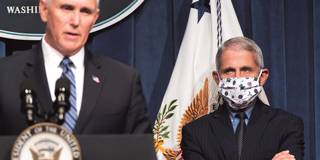After years of politicians and media figures maligning scientific expertise as elitist, the COVID-19 pandemic has revived the public standing of science. But whether this crisis will spur the public and policymakers to heed the science on other global challenges, like climate change, remains to be seen.
URBANA, ILLINOIS – Science has been an indispensable guide for governments, policymakers, and ordinary people during the COVID-19 pandemic, whether they are making major decisions about closing or opening economies, or smaller ones about whether to go to the grocery store.
Owing to the urgent need for sound information about the virus, science journals have accelerated the process for publishing peer-reviewed research. And some top journals, including Nature, have been wading through new findings and summarizing the current scientific knowledge about the virus for use by policymakers. By disseminating new evidence as quickly as possible, the global scientific ecosystem has helped to slow the spread of the disease and save lives. Now, all eyes are on research to develop new treatments and vaccines.
These developments raise important questions for our engagement with other issues, not least climate change. Are rapidly changing publishing standards and streamlined peer-review processes something to worry about, given that they could increase the likelihood of bad science being published? Will politicians, corporations, and others misuse or abuse preliminary findings? Retractions of studies that lent support to the use of hydroxychloroquine for treatment of COVID-19 suggest that such questions are not unwarranted.

URBANA, ILLINOIS – Science has been an indispensable guide for governments, policymakers, and ordinary people during the COVID-19 pandemic, whether they are making major decisions about closing or opening economies, or smaller ones about whether to go to the grocery store.
Owing to the urgent need for sound information about the virus, science journals have accelerated the process for publishing peer-reviewed research. And some top journals, including Nature, have been wading through new findings and summarizing the current scientific knowledge about the virus for use by policymakers. By disseminating new evidence as quickly as possible, the global scientific ecosystem has helped to slow the spread of the disease and save lives. Now, all eyes are on research to develop new treatments and vaccines.
These developments raise important questions for our engagement with other issues, not least climate change. Are rapidly changing publishing standards and streamlined peer-review processes something to worry about, given that they could increase the likelihood of bad science being published? Will politicians, corporations, and others misuse or abuse preliminary findings? Retractions of studies that lent support to the use of hydroxychloroquine for treatment of COVID-19 suggest that such questions are not unwarranted.